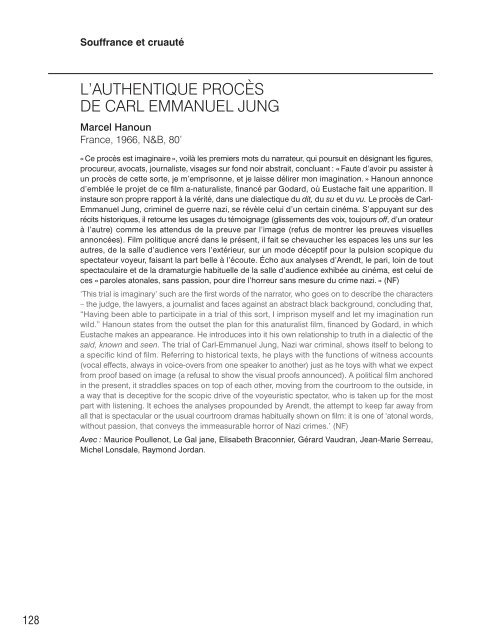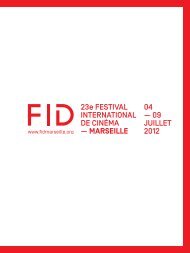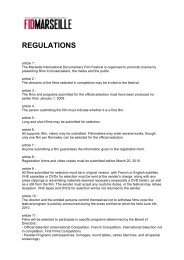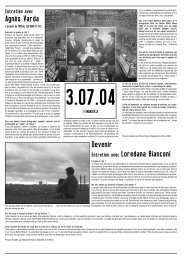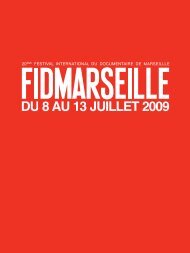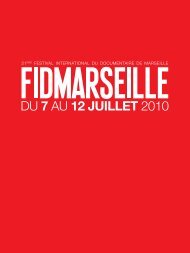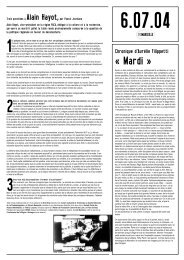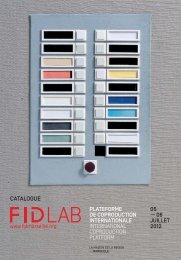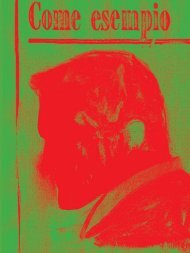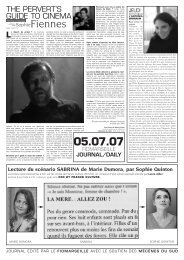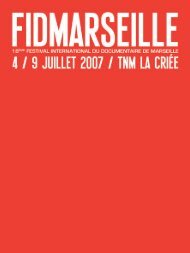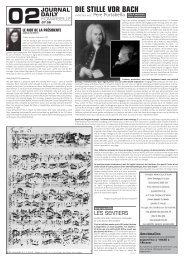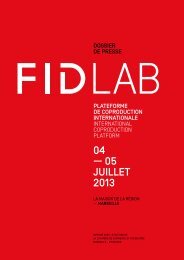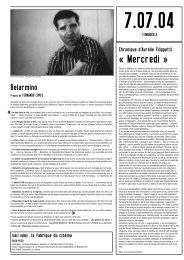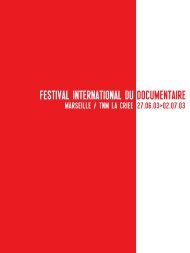FID Marseille 2011 - Festival international du documentaire de ...
FID Marseille 2011 - Festival international du documentaire de ...
FID Marseille 2011 - Festival international du documentaire de ...
Create successful ePaper yourself
Turn your PDF publications into a flip-book with our unique Google optimized e-Paper software.
Souffrance et cruautéL’AUTHENTIQUE PROCÈSDE CARL EMMANUEL JUNGMarcel HanounFrance, 1966, N&B, 80’« Ce procès est imaginaire », voilà les premiers mots <strong>du</strong> narrateur, qui poursuit en désignant les figures,procureur, avocats, journaliste, visages sur fond noir abstrait, concluant : « Faute d’avoir pu assister àun procès <strong>de</strong> cette sorte, je m’emprisonne, et je laisse délirer mon imagination. » Hanoun annonced’emblée le projet <strong>de</strong> ce film a-naturaliste, financé par Godard, où Eustache fait une apparition. Ilinstaure son propre rapport à la vérité, dans une dialectique <strong>du</strong> dit, <strong>du</strong> su et <strong>du</strong> vu. Le procès <strong>de</strong> Carl-Emmanuel Jung, criminel <strong>de</strong> guerre nazi, se révèle celui d’un certain cinéma. S’appuyant sur <strong>de</strong>srécits historiques, il retourne les usages <strong>du</strong> témoignage (glissements <strong>de</strong>s voix, toujours off, d’un orateurà l’autre) comme les atten<strong>du</strong>s <strong>de</strong> la preuve par l’image (refus <strong>de</strong> montrer les preuves visuellesannoncées). Film politique ancré dans le présent, il fait se chevaucher les espaces les uns sur lesautres, <strong>de</strong> la salle d’audience vers l’extérieur, sur un mo<strong>de</strong> déceptif pour la pulsion scopique <strong>du</strong>spectateur voyeur, faisant la part belle à l’écoute. Écho aux analyses d’Arendt, le pari, loin <strong>de</strong> toutspectaculaire et <strong>de</strong> la dramaturgie habituelle <strong>de</strong> la salle d’audience exhibée au cinéma, est celui <strong>de</strong>ces « paroles atonales, sans passion, pour dire l’horreur sans mesure <strong>du</strong> crime nazi. » (NF)‘This trial is imaginary’ such are the first words of the narrator, who goes on to <strong>de</strong>scribe the characters– the judge, the lawyers, a journalist and faces against an abstract black background, concluding that,“Having been able to participate in a trial of this sort, I imprison myself and let my imagination runwild.” Hanoun states from the outset the plan for this anaturalist film, financed by Godard, in whichEustache makes an appearance. He intro<strong>du</strong>ces into it his own relationship to truth in a dialectic of thesaid, known and seen. The trial of Carl-Emmanuel Jung, Nazi war criminal, shows itself to belong toa specific kind of film. Referring to historical texts, he plays with the functions of witness accounts(vocal effects, always in voice-overs from one speaker to another) just as he toys with what we expectfrom proof based on image (a refusal to show the visual proofs announced). A political film anchoredin the present, it straddles spaces on top of each other, moving from the courtroom to the outsi<strong>de</strong>, ina way that is <strong>de</strong>ceptive for the scopic drive of the voyeuristic spectator, who is taken up for the mostpart with listening. It echoes the analyses propoun<strong>de</strong>d by Arendt, the attempt to keep far away fromall that is spectacular or the usual courtroom dramas habitually shown on film: it is one of ‘atonal words,without passion, that conveys the immeasurable horror of Nazi crimes.’ (NF)Avec : Maurice Poullenot, Le Gal jane, Elisabeth Braconnier, Gérard Vaudran, Jean-Marie Serreau,Michel Lonsdale, Raymond Jordan.128


